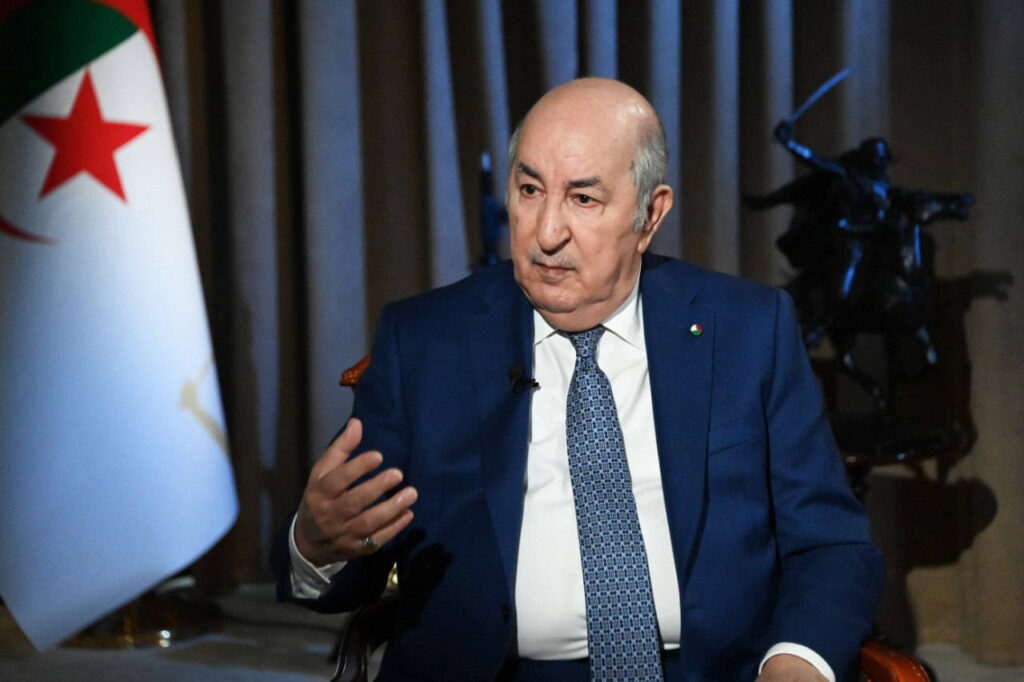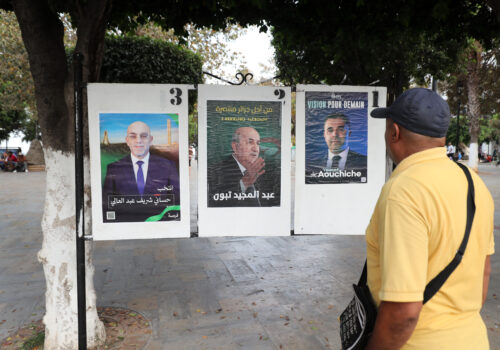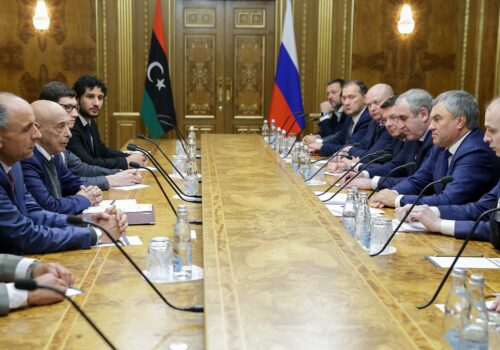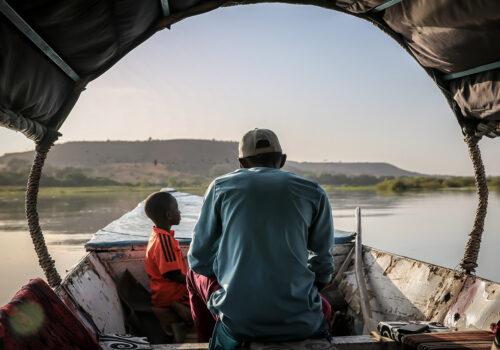President Abdelmadjid Tebboune appears sure to win reelection in Algeria’s September 7 presidential election. But behind the certainty of the outcome lie deeper questions over the country’s political future.
Despite a mixed record on foreign policy and the economy, Tebboune has increased his popular support by partly redirecting windfall oil and gas revenues into expanded social spending. He also enjoys the substantial advantages of incumbency in Algeria’s highly centralized presidential system. Algeria’s largest political parties, unions, and social organizations—which function as tacit arms of the state—all support his campaign. Most critically, he has the backing of the country’s powerful security apparatus, which has ruled the country from behind the scenes for six decades.
During his first years in office, the military’s support was less certain. Just days after Tebboune’s inauguration in December 2019, army chief Ahmed Gaid Salah died of a heart attack, stranding the new president without his main benefactor. Since then, rumors have circulated of squabbles and backstabbing between the president’s office and the new army leadership. In December 2022, Ihsane El Kadi, one of Algeria’s last remaining independent journalists, wrote an op-ed questioning just how firmly the army supported Tebboune. Merely posing the question was enough to make El Kadi the first political detainee of this election cycle. He would not be the last.
Algerian authorities seemingly intimidated several of Tebboune’s potential challengers into seeking exile abroad or announcing their retirement from politics. Others were weeded out this summer in the candidate registration process, which saw some punished with electoral fraud charges. In the past couple weeks, security forces have also detained multiple high-profile political dissidents. The seizures have been accompanied by an uptick in state propaganda, along with conveniently timed operations to break up an alleged separatist plot and spy ring.
While familiar from previous elections, none of these measures are the hallmark of a strong leader confident in his electoral chances—or of a strong state confident in its stability.
They indicate that the country’s military and political leaders correctly understand elections to be moments of vulnerability. It was an aborted election in 1992—part of a long-overdue, yet nonetheless ill-prepared democratic transition—that tipped the country into civil war. And it was an approaching election in 2019 that sparked the Hirak, a nationwide protest movement calling for new leaders and a new governing system.
Military leaders rebuffed that demand, instead imposing a new election that saw Tebboune designated over protesters’ objections. Their boycott has tarnished his legitimacy ever since.
If Tebboune and his fellow candidates manage to incite turnout beyond that of 2019, the president will enter his second term with the wind at his back.
Having done what was needed in his first term to shore up the army’s support (including doubling the military budget and tightening laws to stifle the Hirak), Tebboune is now returning to the population in hopes of obtaining a more convincing mandate.
He was last elected with 58.1 percent of the vote, a share he is likely to exceed this weekend. Less clear is how many Algerians will choose to vote.
Official turnout in 2019 was just 39.9 percent, a historic low for an Algerian presidential election. Of those who voted, one in eight cast an invalid ballot, a common form of protest vote in Algeria. In fact, turnout has been trending downward and protest votes trending upward in recent presidential elections. Tebboune knows that his second term will be smoother if he can improve on these figures.
To help him do so, he has enlisted two willing contenders: Youcef Aouchiche, leader of the left-wing Socialist Forces Front, and Abdelaali Hassani Cherif, head of the Movement of a Society for Peace, Algeria’s largest Islamist party. They are the only two candidates whom electoral officials authorized to challenge Tebboune. Both consider their parties among the “constructive opposition,” and have chosen to run in order to engage their bases, build electoral credibility over rival parties, and curry favor with the authorities ahead of legislative elections expected by 2026. Alongside Tebboune, they have spent the three-week official campaign period imploring Algerians to turn out in force.
The question of participation rates is among the few unsettled ones around this election. If Tebboune and his fellow candidates manage to incite turnout beyond that of 2019, the president will enter his second term with the wind at his back. If turnout is low, authorities are likely to blame it on timing: Tebboune’s choice to schedule the campaign and election amid the summer vacation period offers a convenient excuse for low turnout. But Tebboune has already shown through his first term that even with limited electoral legitimacy, the combined strength of his office, hydrocarbon revenues, and the army’s backing can suffice to buttress his rule.
Algeria’s election is likely to ensure continuity. Those Algerians who yearn for more participatory governance, protection for essential freedoms, and economic diversification beyond oil and gas will be kept waiting once more.
Andrew G. Farrand is a nonresident senior fellow with the Atlantic Council’s Middle East Programs and author of The Algerian Dream.
Further reading
Fri, Aug 30, 2024
Algeria has never seen a smooth transfer of power. It won’t in this election, either.
MENASource By Andrew G. Farrand
A weak slate of alternative candidates and the near certainty of Abdelmadjid Tebboune’s victory will do little to inspire participation.
Tue, Jul 30, 2024
Libya is the crucial hub for Moscow’s activities in Africa
Report By
Over the past decade, Russia’s involvement in Libya is evidence of its realization that it could transition from a marginal power to a significant competitor in the country, and thus in the broader Middle East and North Africa.
Fri, May 24, 2024
Behind Morocco’s bid to unlock the Sahel
AfricaSource By Rama Yade, Abdelhak Bassou
The people in Sahelian countries deserve peace and prosperity. Morocco's newest initiative could offer a plan to help attain that.
Image: Algerian President Abdelmadjid Tebboune speaks during an interview with Qatar s Al-Jazeera TV in Algiers on March 22, 2023. Photo by Algerian Presidency Office Algeria



